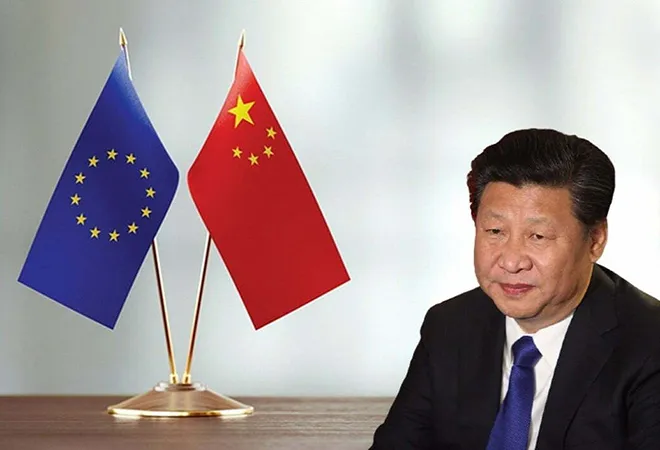-
CENTRES
Progammes & Centres
Location

Ahead of one of the most awaited political summits focusing on the future relations between the European Union (EU) and China, the High Representative of the Union for Foreign Affairs and Security Policy, Josep Borrell, stated unequivocally in an interview for the Financial Times that Europe should develop “a ‘more realistic approach to China’, especially after its crackdown on Hong Kong”. Interestingly, the EU top diplomat described the complicated relations with the “systemic rival” China as no longer being “linear” but with “multiple faces” alluding to the nexus between a cooperative and a confrontational course, while being caught in a competition between China and the USA. Against this background, Borrell stressed the necessity of choosing a third way in order to prevent a scenario of “being squeezed between the two superpowers.”
Obviously, the bilateral relationship with China has become more complicated and multifaceted following the Covid-19 virus outbreak and Beijing’s oppressive policy towards Hong Kong. Organizing a summit in Leipzig, which should facilitate the signing of a final agreement on investment relations during the German presidency of the EU Council, was seen as a symbolic act of greatest urgency. However, the long-awaited top-level meeting had to be postponed due to the Covid-19 restrictive measures.
"The bilateral relationship with China has become more complicated and multifaceted following the Covid-19 virus outbreak and Beijing’s oppressive policy towards Hong Kong"
For Germany and the EU institutions, taking the bilateral relationship with China to the next level was a high priority on their political agenda. However, the outbreak of the worldwide Covid-19 crisis postponed the plans of negotiating and eventually concluding a comprehensive investment deal. Since 2019, the EU has managed to redefine its view of the strategic partnership with Beijing, naming it a “systemic rival” and an “economic competitor” next to a “cooperation partner”.
The economic contraction of all European states following the Covid-19 crisis increased the strategic necessity for signing a Comprehensive Agreement on Investment (CAI). Previously, a similar EU-China summit took place by video conference on 22 June, which did not result in a joint statement. Consequently, a virtual EU-China summit took place on 14 September instead of a long-planned physical encounter between the leaders of the EU institutions (President of the European Council Charles Michel and European Commission President Ursula von der Leyen) as well as the German Chancellor Angela Merkel on the one side, and the Chinese president Xi Jinping on the other side.
Once again, the main focus of the discussions was on issues of investment and trade relations, the need for reciprocity in terms of market access, mutual benefits from a fair market competition as well as the goal of deepening business relations and taking ownership in fields of shared interests such as climate change and post-Covid-19 recovery. As the European decision-making process is two-fold, involving the EU institutions in Brussels and national governments of the member states, each of the European representatives focused on a particular set of issues. The president of the European Commission von der Leyen covered CAI and future business relations, while Charles Michel drew the attention to the agenda of human rights and the recovery from the Covid-19 crisis outbreak. Furthermore, the German Chancellor Merkel addressed the urgent topics of climate change and multilateral cooperation, while rather neglecting the pressing concerns about the situation in Hong Kong, Xinjiang and Tibet.
"The German Chancellor Merkel addressed the urgent topics of climate change and multilateral cooperation, while rather neglecting the pressing concerns about the situation in Hong Kong, Xinjiang and Tibet"
The EU-China summit did not finalize the long-awaited CAI, however it was a step forward in achieving a more balanced and nuanced relationship with Beijing. While the key message from the EU was “reciprocity, responsibility, and basic fairness”, China addressed four commitments, namely “peaceful coexistence, open cooperation, multilateralism, as well as dialogue and consultation.”
While the main protagonists made some progress with little deliverables regarding the negotiations on the CAI and other key topics, the summit facilitated the signing of a bilateral agreement on 100 European Geographical indications (GIs) in China as well as 100 Chinese GIs in Europe. However, the meeting failed to mark a substantial breakthrough in the bilateral relations. The goal remains to complete the negotiations on an investment treaty before the end of this year. Furthermore, von der Leyen addressed three key issues of utmost importance “regarding the behaviours of state-owned enterprises, then on technology transfer, and on transparency on subsidies”.
From a European point of view, there are still major asymmetries associated with market access and sustainable development as well as the opening-up of key sectors such as “telecoms, IT, health, financial services and manufacturing”. Unresolved challenges remain such as the role of State-Owned Enterprises (SOEs), the forced tech transfers and the transparency of subsidies as well as the Chinese market openness to European companies.
From a Chinese point of view, the leadership stressed the need for a peaceful co-existence, which respects the different political models in the world associated with different civilisations and cultures. Furthermore, Beijing sees its own development being strengthened through better connectivity and a circular economy, based on sustainable joint development. One of the major points of intersection is the approach to multilateralism through bilateral, regional and global cooperation to boost the UN-led international order. A possible scope of security issues could be centred around cooperation regarding the Iran nuclear deal, the future of Afghanistan as well as the denuclearization of the Democratic People’s Republic of Korea. Finally, the importance of deepening the dialogue and consultations was stressed by the Chinese counterparts in order to cope with differences in the future.
Clearly, there are further overlapping areas of shared interests and goals, which are associated with the Fourth Industrial Revolution and digitalization. A high-level digital dialogue on science and technology is a mutual priority for Europe and China which, however, should be “underpinned by high ethical and integrity standards.” Furthermore, the topics of climate and biodiversity were addressed, and a High-Level Environment and Climate Dialogue was announced to address all relevant issues and commitments in the future. Finally, the topic of Covid-19 response at the institutional level as well as the related economic recovery was extensively discussed. Both parties agreed to “strengthen the role of the World Health Organisation, including the full implementation of the World Health Assembly resolution of May 2020.”
China is becoming increasingly important as an export market, which is why it is so difficult for the German government and the EU institutions to deal with Beijing as an economic and trade partner while having to ignore serious issues of human rights violation.
"China is becoming increasingly important as an export market, which is why it is so difficult for the German government and the EU institutions to deal with Beijing as an economic and trade partner while having to ignore serious issues of human rights violation."
For Europe to become a player, instead of being solely a playing field for the systemic rivalry between the USA and China, it would be crucial to engage Beijing in a more coherent and resolute manner while upholding European interests, values and norms. Obviously, there are still asymmetries that need to be further addressed, however, it will be increasingly difficult for Brussels and the European member states to induce China to refrain from escalating the situation in various hotspots in the international relations such as the South China Sea, the introduction of the National Security Law in Hong Kong, or the persecution of the Uighur minority in Xinjiang. Finally, major issues such as 5G connectivity, the introduction of an investment screening mechanism, and Beijing’s involvement in disinformation campaigns related to Covid-19 in Europe will have a major impact on the bilateral relationship in the future.
The views expressed above belong to the author(s). ORF research and analyses now available on Telegram! Click here to access our curated content — blogs, longforms and interviews.

With over two decades of professional experience and academic background in security and defense Velina Tchakarova is an expert in the field of geopolitics. Velina ...
Read More +